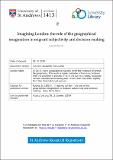Imagining London : the role of the geographical imagination in migrant subjectivity and decision-making
Abstract
This article employs a qualitative, biographical approach, to explore the motivations and subjectivities behind migration of middle‐class Brazilians to London. It uses the concept of the geographical imagination to understand how migrants imagine not only their destinations and places of origin but also how their own identity is shaped by their imagined relationship to these places. The paper argues that for many middle‐class Brazilians, their motivation to migrate is couched in terms of “societal alienation”: a feeling of distance from the place of origin resulting from a lack of identification and trust in its institutions and the very culture of the place itself. This is in contrast to the more popularly understood concept of migrating due to “material alienation”: migrating to access a higher level of material consumption or to acquire financial capital to use “back home.” For those who migrate due to “societal alienation” what is “fetishised” is the cultural and less material aspects of the ‘quality of life’ of the migration destination, which become a kind of commodity in their own right. It argues that social class which often intersects with regional and racial divisions within Brazilian society, is a key marker of difference in these two types of imaginary.
Citation
Robins , D J 2019 , ' Imagining London : the role of the geographical imagination in migrant subjectivity and decision-making ' , Area , vol. 51 , no. 4 , pp. 728-735 . https://doi.org/10.1111/area.12519
Publication
Area
Status
Peer reviewed
ISSN
0004-0894Type
Journal article
Description
Funding: St Andrews’ Janet T Anderson ScholarshipCollections
Items in the St Andrews Research Repository are protected by copyright, with all rights reserved, unless otherwise indicated.

